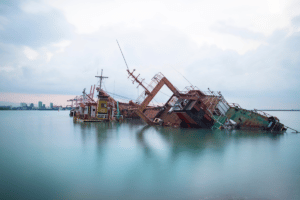When a seaman dies aboard a ship because it is unseaworthy or there was negligence on the part of the employer, family members can file a maritime lawsuit under the provisions of the Death on the High Seas Act (DOHSA). Passed by Congress in 1920, DOHSA allows family members to file for damages against the negligent owner of a vessel on behalf of maritime workers killed while on the job and out to sea. Even though DOHSA was intended to apply to cases involving vessels sailing beyond the three-nautical mile limit off the coast of the United States, its territories, or dependencies, the law also covers fatal aircraft crashes in international waters.

Legal Remedy Under DOHSA
In cases of fatal sea and aircraft accidents that occur beyond U.S. territorial waters, the deceased’s surviving family members are entitled to file a DOHSA suit to obtain legal remedy for their loss. Typically, a DOHSA compensation claim covers:
- Funeral expenses
- Loss of existing or expected financial support
- Counseling expenses
- Other financial costs caused by the death
Although the Death on the High Seas Act resembles Jones Act provisions about employers’ negligence and vessels’ states of unseaworthiness, its scope is not limited to providing legal remedy to seamen. The DOHSA coverage of legal remedy rights is granted to two groups:
- Workers or passengers on a vessel who are killed beyond the three-mile territorial limit
- Workers or passengers on commercial airliners who are killed beyond the 12-mile international waters limit
If a lawsuit filed under DOHSA results in compensation, any financial proceeds go only to family members of the deceased. The DOHSA list of qualified beneficiaries is clearly defined and can’t be changed or expanded. Currently, only the following are eligible for legal remedy in DOHSA lawsuits:
- Spouse
- Children
- Parent
- Dependent family members
When filing a lawsuit under DOHSA, the plaintiff must prove that either negligence or poor judgement of a vessel’s owner caused the death of their loved one, or that the vessel was not seaworthy. In cases of airline crashes at sea where DOHSA applies, similar causality issues of negligence, bad decisions, or airworthiness are considered. Though there are many types of incidents that are covered under DOHSA law, the most common are:
- Overturned or sunken vessel
- Onboard fire or explosion
- Defective equipment or mechanical error
- Failure to follow safety procedures
- Failure to give appropriate medical care
- Incompetence in training of personnel
DOHSA Statute of Limitations and Decedent’s Contributory Negligence
As in all maritime personal injury cases, lawsuits filed under DOHSA are controlled by the three-year statute of limitations. A case must be filed within this time period because DOHSA lawsuits are often complex and require a great deal of preparation. The process of calculating lost wages and future lost earnings is complicated, and establishing who is at fault requires careful examination of physical evidence and documentation.
If the deceased was partly at fault for the incident that led to the death, DOHSA rules do not rule out any financial remedy to the family. However, contributory negligence is a factor that can be considered in cases where DOHSA applies. As a result, the amount of the award may be reduced in proportion to the level of contributory negligence by the decedent.
For more information on DOHSA regulations, refer to the House of Representatives’ official U.S. House Report 106-32.